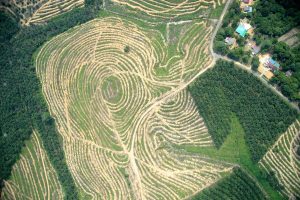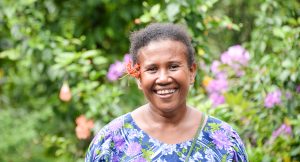The illegal land grab in Papua New Guinea
5.2 million hectares of land in Papua New Guinea has been handed over to loggers.
In 1996 the government developed a scheme granting Special Agricultural Business Leases. It allowed land owned by communities to be leased, with their consent, to people or groups interested in carrying out agricultural projects, and was originally meant to help communities develop agricultural projects.
For a while, it was used only on a limited basis, for small scale projects.
But in the last ten years, there’s been an explosion in the number of SABLs issued, and in the amount of land leased in each one.
The government changed their forestry laws making it much easier for big foreign companies to get permission to clear big areas of forest for agricultural projects.
In reality, these projects are often a foil for large scale logging.


In 2014 there was a study of 36 agricultural projects involving 51 SABLs. Just four of these projects had the potential to produce crops, either because the soil was unsuitable, the developer was inexperienced, or there was no support from local landowners.
In many of these areas, the amount of logging far exceeded what was required for agricultural purposes, and in lots of cases there wasn’t any evidence of agricultural development happening at all. The companies had just taken the logs and left.
This has left local communities with land that’s completely degraded: they’re unable to grow food for themselves and their homes are at increased risk from landslides and coastal erosion.
Even in the projects that looked like they might be suitable for agricultural projects, a lot of landowners claim that they never agreed to the SABLs, and there are strong rumours of fraud and forgery. Most SABLs last for 99 years, meaning local peoples’ land rights are effectively destroyed.
These SABLs cover 12% of Papua New Guinea’s total land area. At least 5.2 million hectares have been handed over without the consent of landowners.
The study concluded that a “large-scale land grab” had occurred – all under the guise of sustainable agricultural development. It concluded that “greed and corruption at all levels… have tainted a noble landowner empowerment initiative”.
It’s no wonder that when we first meet with communities, their first question is often whether they will keep ownership of their land. These are people who have been exploited and harmed time and time again by governments, companies, and other NGOs.
It’s why we make it very clear at the start of any partnership that all our projects are designed, developed, and controlled by local people. They will always own the land, and can decide as a community how funds are invested.
At the start of each project in Papua New Guinea, we will fund a Department of Land survey. This marks the boundaries of customary lands using GPS and provides official ownership paperwork to the community that means SABLs can’t be issued.


